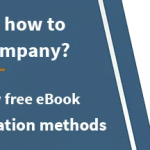The COVID-19 crisis has affected most sectors, including the M&A. Several entrepreneurs are asking how the value of their company has changed because of the crisis. To answer this question, we have to separate those firms that have the financial capacity to survive this crisis and those who don’t. The buyers are also aware of the fact that the crisis has affected all companies and they know that there might be delays in production or difficulties to sell or receive payments. Therefore, the investors do not consider the happenings of 2020 as a base for the value of the business. Currently, the value is determined more subjectively than objectively to facilitate selling the company for a fair price.
Importance of valuation dates
First of all, the valuation date has become more important than ever before. As the crisis is has affected the market and the situation of many companies negatively, the value of most companies was not the same in 2019 December, as in 2020 March, and probably it will not be the same in 2021.
Therefore, when determining the value of the business, advisers consider the value before the crisis, and the possible value after the crisis. They treat 2020 as an exception because of the unusual circumstances, as the change in value was not the fault of the business owners, there is no need to punish them.
Price is not equal to value
It is also essential to highlight that the value and the worth of a company are not the same. The price is the exact value of the materialization of a company at the moment of the sale and depends on the offer and the demand as well. On the other hand, the value is the monetary measure of the degree of utility that the company reports to it.
Therefore, just because the current value of the company is much lower now than a year ago, does not mean that the price of sale is reduced as well. The important is to find several buyers making offers and competing for the firm, so the company can choose the best option, maximizing the value of the sale.
Risk and Profitability
Buyers make their finical decision about the company they want to buy based on the risk and the profitability of the firms. If two companies are facing the same risks, they will choose the one with higher profitability. Some of the risks that buyers have to face because of this extraordinary situation are the regulatory changes or the loss of significant contracts. Nevertheless, these risks will disappear during the year of 2021.
It is also important to mention the risks associated with the cash-flows. We cannot talk about “risk-free” rate anymore, and the unsystematic risk has to include the extra risks because of the COVID-19. Besides, advisers have to rely on the middle and long projections, which might become true, or might not. The recovery of the sector from the crisis should be considered during the valuation, as it may vary by business areas. Also, it is recommended to calculate with the possible change in consumer habits because of the crisis, as it can affect the future profitability of the companies too.
The advisors should make analysis of the expectations of the future situation of the economy and the sector, using the most information at the moment of the valuation, with a goal of providing realistic image of the company. If you want to know how risk affects investment terms, read about it in our article.
Personal Reasons for selling a company
Last but not least, the personal reasons can affect the valuation process during the COVID-19 crisis as well. The decision of selling a company evokes emotions in every entrepreneur. If the sale is forced by the external environment, which can be the crisis, an illness or other reasons, it can be even more difficult to finally decide to sell the firm. The business valuation always depends on the personal reasons of the entrepreneur. The seller might want to fasten the process because of personal issues, but it can also occur that he has unrealistic expectations which make the procedure slower. The valuation is an instrument of negotiation, and the negotiation is a dance between the rational arguments, aiming for the best possible result.
To conclude, just because we are in a crisis now, it does not mean that it cannot be the perfect moment for selling your company. It is true, that the COVID-19 crisis has affected the business valuation and the sales process of businesses as well. However, as in every other area of life, we have to adapt to the new situation instead of letting it control us. The buyers and investors are also aware of the extraordinary situation and the M&A advisors continue searching for the best buyer for the firms and they do their best to determine the most appropriate price for both parties.
ONEtoONE Company Valuation Service
Having an accurate and comprehensive company valuation is very useful as it provides detailed information on the variables that underpin a business’s value. Company valuation is needed for buyers and sellers to during the sale process. For sellers, valuation is a negotiating tool that assists in the negotiation process. On the other hand, buyers should not accept the seller’s valuation, they should do their own. Our experienced advisors can help you to determine the value of your business, or the business you are planning to buy, to gain a competitive position in the market.
About ONEtoONE
At ONEtoONE we have a broad knowledge of the Mergers and Acquisitions sector, as we have participated in more than 1000 mandates. Our company is specialized in international middle-market M&A advisory. We are continuously focusing on improving the techniques to achieve the best possible price for our clients, and we also advise on acquisitions, strategic planning and valuation. We are pleased to give our opinion about company valuation or other aspects of a possible corporate operation. If you need an advisor while buying or selling a company,
contact us.


























